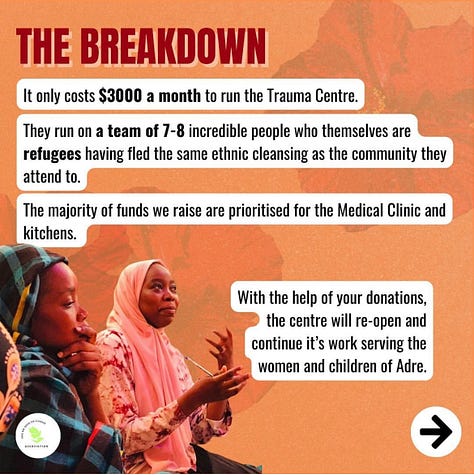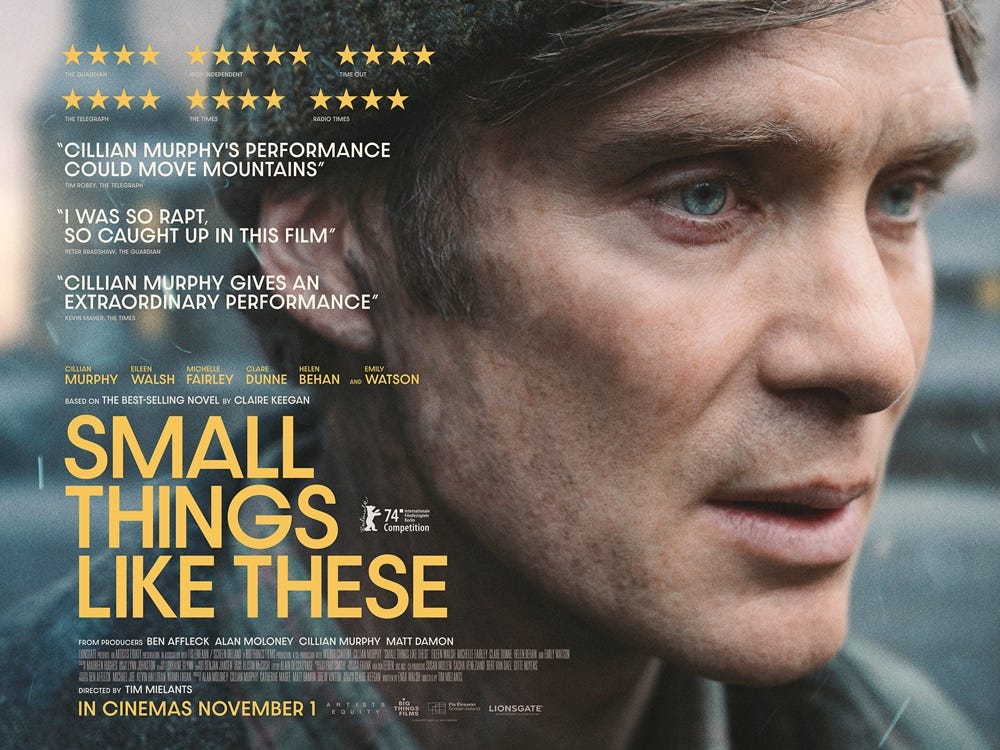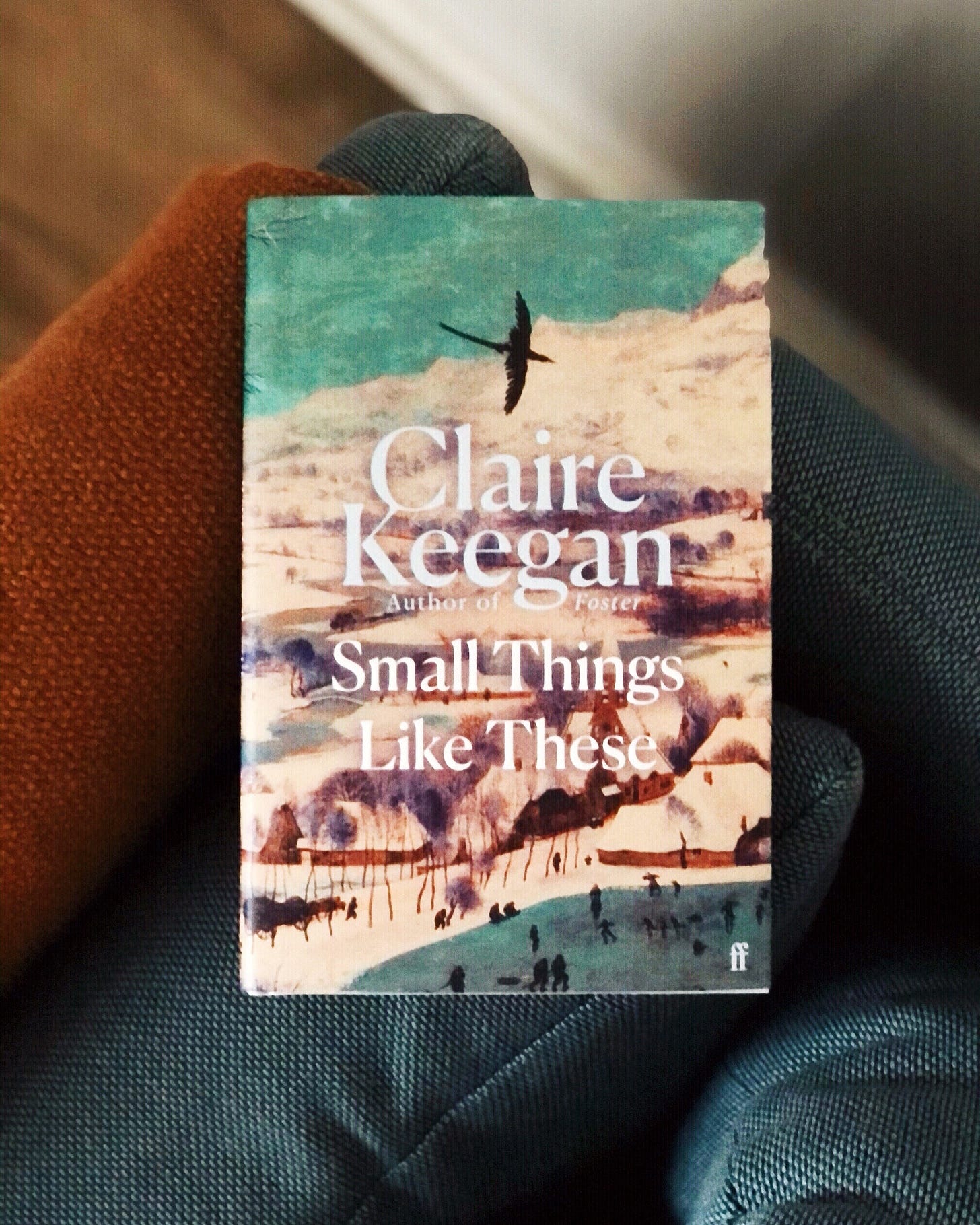21. A Soft Heart is No Small Thing
Small Things Like These inspired reflections and a brief run-down of all of Claire Keegan's books. Want to know which ones are worth your time? Keep reading...
Claire Keegan’s 2021 novel(la), Small Things Like These was my introduction to the Irish author’s writing and I adored it; it is one of those books I associate with a particular moment in time and, to this day I’m glad it was this book, and not one of her earlier works, that served as my introduction to her storytelling (more on the reasons for this later).
Last week I took advantage of a quiet afternoon to go and see the recently-released film adaptation and, unsurprisingly, it inspired this post. The film stars Cillian Murphy as protagonist Bill Furlong, a coal- merchant and devoted husband and father who, in the course of his work, discovers some disturbing goings-on at the local convent. This discovery leads Bill to reflect on his own past while wrestling with what he’s seen and what he should do about it.
I loved the film in its entirety but there’s a particular scene I found myself reflecting on. About two thirds of the way through, Bill shares with his wife, Eileen, what he has discovered, or at least alludes to it. The late night conversation takes place as he sits uneasily on the edge of the bed and she, already under the covers and ready to settle down for the night, decides to address the changes she has seen in Bill’s demeanour. Bill is clearly not himself- a fact that worries her- but what worries her more than this is made apparent as she, in a most resigned tone, bemoans her husband’s ‘soft heart’.
Eileen knows how hard they have worked to build the life they have and, while Bill’s business keeps him busy, it also keeps the couple and their five daughters comfortable, and they are all too familiar with the fates of those in their community who haven’t been able to do quite as well for themselves. Eileen knows what’s at risk if Bill decides to act on what he’s seen and her fear of the potential repercussions leads her to warn Bill that if you are to get on in this life, there are some things you have to ignore.
While Small Things Like These is dedicated to the thousands of girls who were victims of the Magdalene laundries between the 1920s-1990s and the many children who were stolen from them, the story’s message can be applied to any atrocity you can think of and most certainly applies to those we are currently witnessing.
What we are told- what we have always been told- is that if we are to get on in life there are things we have to ignore. In other words, we must harden our hearts. But it is the softness of our hearts- the desire and inclination to move through the world with compassion, tenderness, and empathy - that urges us to respond to another’s pain and prevents us from willingly inflicting it, that resists the normalisation of ceaseless brutality, and rejects any notion that our own lives, or the lives of those most like us, are more precious than anyone else’s.
What we are threatened with by the ruling class are the things that we are told hold the most value: financial security (which, for so many people, is a carrot forever dangling just a little out of reach), our jobs, our homes, our own personal comforts and various other individualistic aspirations; they would have us so afraid of the very possibility of personal disaster that we’ll overlook or even justify the hell they are raining down on others if it might allow us to avoid it.
While there is no denying Bill Furlong’s heroism, Cillian Murphy’s emotionally charged portrayal of the character also serves as a reminder that in our attempts to stand against injustice, fearlessness is never the aim; rather it is to allow yourself to be led by the softness of your heart and to act accordingly, even as your voice shakes and your whole body trembles in fear.
What Small Things Like These ultimately asks us to consider is the extent to which we are willing to sacrifice any aspect of our own comfortable existence for someone else’s sake, and the individual responsibility we have to do so.
Before I move onto the books, I wanted to take a moment to share an organisation doing incredible work for the hundreds of thousands of people displaced as a result of the ongoing war in Sudan. Saving Al-Geneina (Hope & Haven Refugees) is providing essential services, including education, medical care, dignity kits, food and trauma support, to Sudanese refugees in Adré Camp, Eastern Chad, as well as internally displaced families in Sudan.



Currently, the trauma centre in Adré Camp has had to pause its vital work due to underfunding and there is an ongoing, urgent need for support for their kitchens and dignity kits. If you are in a position to do so, please consider donating to and/ or sharing their campaigns so that they can continue to meet the needs of those going through unimaginable hardship.
More information and donation links.
Onto the Books
Seeing as we’re already on the subject of Claire Keegan, I thought it was the perfect time to share some brief thoughts on her other books. I’m sharing them in publication order but I think it’s pretty clear which ones have my heart and which ones... don’t.
Antarctica (1999)
While Antarctica was Keegan’s debut, it was the one I read most recently; if I’m glad Small Things Like These was my introduction to her writing, I’m really glad this one wasn’t.
In most, if not all of her work, Keegan considers injustice in one form or another and in some of the stories in this collection she attempts to address racial inequality and racially motivated violence as inflicted on Black men in Ireland and America. In particular, Keegan considers (white) women’s sexuality and the lengths (white) men will go to to guard their perceived virtue – the Black man, is of course the depraved predator and the white woman entirely innocent and in need of protection. While I’m going to assume Keegan had the very best of intentions in drawing attention to this reality, unfortunately the execution felt a little clumsy. For example, in one particular story I could not for the life of me understand the need to racialise a rather questionable character with a one-off ‘black’ descriptor- the relevance or contribution to the plot continues to evade me.
This collection was first published in 1999, which is why I’m not hugely surprised that editors and reviewers perhaps didn’t question (or overlooked) some of the choices made but the fact that more recent commentary doesn’t often address it is interesting, especially considering the book was reissued just last year.
Regardless, my main criticism of Antarctica actually has less to do with any of the above and more to do with the fact that it is a decidedly uneven collection. Some stories are excellent (‘Sisters’ is the standout story in my opinion) and you can see how Keegan went on to write some of her later, far more accomplished stories. However, Antarctica is easily my least favourite Keegan and, in my humble opinion, you’re not missing out on much if you choose not to read it.
Walk the Blue Fields (2007)
Walk the Blue Fields is the second of Keegan’s short story collections but the one I read first and it’s definitely my favourite of the two. With that said, I wish I could tell you more about it but I read it during a rather chaotic time and, if I’m being honest, I remember very little other than that I liked it… I did just flip through my copy in an attempt to jog my memory and I was reminded that it does indeed contain some beautifully melancholy, observant stories but it’s the book I feel the least confident about decidedly recommending (or not). If I reread it any time soon, I’ll do my best to update you. With that said, in my experience, I’ve found Keegan’s slightly longer stand-alone stories more striking than her collections. if you’ve read Walk the Blue Fields and your memory serves you better than mine, I’d love to hear what you thought of it.
P.S. Keegan’s story ‘The Forester’s Daughter’, which was published as part of the Faber Stories series, can be found in this collection.
Foster (2010)
A recent reread cemented Foster as my favourite of Claire Keegan’s books. It is beautifully tender and brimming with feeling and a little tenderness gets me every single time. Foster tells the story of a young girl who goes to live with distant relatives - a couple without children of their own- as her mother awaits the birth of another child. I can’t really talk about the things I loved most about this book without saying too much about it but the final scene is one of the most touching things I’ve ever read. At ~forty pages, it is easily read in a few hours but you’ll lose nothing if you choose to savour it.
Small Things Like These (2021)
The film stayed pretty true to the book and I’ve already spoken about that quite a bit so I’ll keep this brief. Small Things Like These is probably my second favourite of Keegan’s books. On some days, it’s my actual favourite. Either way I would wholeheartedly recommend it and, if you want the ultimate experience, I strongly suggest you read this one in the colder months. It is set around the Christmas period and the novel is incredibly atmospheric so if you are able to read it curled up with a blanket, a hot chocolate and a roaring fire/ candles lit then do so and thank me later.
So Late in the Day (2023)
Last but not quite least we have So Late in the Day. I’d say this book is my third favourite but, unlike Antarctica, if it had been my introduction to Keegan’s writing I don’t think I’d have been disappointed. Now, unlike Foster or Small Things Like These I don’t ever find myself considering a reread of this one so do I think it’s absolutely wild that this slim volume costs ten pounds? Absolutely. Is it still worth reading? Sure it is, it’s just not the one I’d prioritise and, unless you’re making a point of collecting all of Keegan’s books, there are always libraries…
So Late in the Day was originally published in the New Yorker in 2022 and is still available here. I hear there are some slight differences between the two versions but I haven’t yet compared them. This story’s protagonist is a man named Cathal, who is contemplating the end of a relationship with a woman called Sabine, as well as reflecting on encounters with various other women. As previously mentioned, Keegan tends to consider injustice in her work and, in this case, misogyny is the focus. However, this story is also about how a lack of generosity, communication failures, carelessness and emotional neglect can destroy relationships. This one didn’t quite have the same emotional impact as some of Keegan’s other work but, like I said, it’s a really good story and there is no denying her ability to craft a good tale.
Have you read any of Claire Keegan’s books?
Have you seen Small Things Like These?
If you haven’t, do you plan to?
If you’ve made it this far, thank you for reading!
For regular reading updates, you can also find me on Instagram.
If you enjoy these letters and you’d like to support me in some way, you can buy me a ‘coffee’ here.
If you like the idea of receiving these letters straight to your inbox, you subscribe for free and I’d love that too.
Until next time,
Tasnim






I must’ve missed your review- will be off to read it ASAP! I think your decision to read Foster in the summer is a very good one because atmospherically it is definitely the most summer-feeling of her books. You’re in for such a treat when you do get to it though. In the meantime I’d probably recommend So Late in the Day but I’d also be interested to see how you get on with Walk the Blue Fields. Like I said, I can’t confidently recommend that one because I don’t remember it well enough but I also think it’s the one that gets the most overlooked.
If you haven't watched it already, I so recommend watching the film adaptation of Foster, called The Quiet Girl. They really do justice to the story and it is a beautiful watch (and quite uniquely is mostly Irish language too). It'll make you weep, though.
I look forward to watching Small Things Like These - as you say, the implications of that story go far beyond just its immediate context, and I'm very glad to hear you liked it as an existing fan of the book.
And thank you as always for pointing us in a good direction for donations for Sudan!